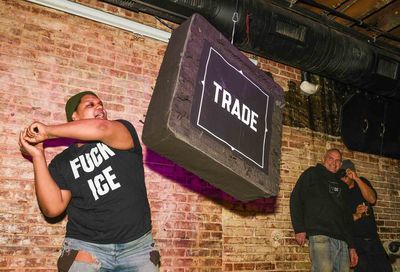Lesbian security guard’s lawsuit could be headed to Supreme Court
Jameka Evans' lawyers argue her employer violated her rights under Title VII of the Civil Rights Act

Lawyers for a lesbian security guard who claims she was discriminated against because of her failure to adhere to gender norms will appeal their case to the U.S. Supreme Court.
The move comes after the full 11th U.S. Circuit Court of Appeals refused to rehear the case.
Jameka Evans, a security guard at Georgia Regional Hospital, initially sued her former employer in April 2015 for discriminating against her, claiming the hospital had violated her rights under Title VII of the Civil Rights Act, which prohibits sex-based discrimination.
A federal court dismissed Evans’ lawsuit, saying that Title VII did not protect her as a lesbian.
Lambda Legal, representing Evans, appealed to the 11th Circuit, arguing that discrimination based on sexual orientation is a form of sex discrimination — a contention that other courts have agreed with, as well as the Equal Employment Opportunity Commission.
In March, a three-judge panel on the 11th Circuit rejected Evans’ appeal, agreeing with the lower court’s finding. Evans’ lawyers then petitioned for en banc review, in which all currently serving members of the circuit would agree to rehear the case. That request was officially rejected on Thursday.
“We plan to take this to the Supreme Court,” Greg Nevins, counsel and employment fairness strategist for Lambda Legal, said in a statement. “This extremely troubling decision does not slow the momentum that is building behind our efforts to combat employment discrimination against lesbian, gay and bisexual workers in the courts.
“We will continue to press the legally correct argument, recognized by so many other courts, that the Civil Rights Act protects all workers against sexual orientation discrimination, whether they are gender-conforming in particular ways or not.”
The crux of Evans’ case relies on whether there is a distinction between discrimination based on sexual orientation, and discrimination based on failure to adhere with traditional gender norms — the latter of which the Supreme Court has determined violates Title VII.
Recently, the 7th U.S. Circuit Court of Appeals ruled that a community college in Indiana had violated Title VII when it denied an adjunct professor various promotions and full-time status after they found out she was a lesbian. In its 8-3 ruling, the majority found that “the line between a gender nonconformity claim and one based on sexual orientation” is “gossamer-thin,” adding that such a distinction “does not exist at all.”
Evans’ lawyers want federal courts, including the Supreme Court, to reach that same conclusion. If the courts fail to recognize that there is no distinction between sexual orientation discrimination and discrimination based on a person’s gender nonconformity, it will rest in the hands of Congress to pass an amendment to Title VII that explicitly protects LGBTQ people.
Evans’ case is not the only one dealing with Title VII currently working its way through the courts. In May, the 2nd U.S. Circuit Court of Appeals recently granted en banc review in a similar case, in which a gay skydiver, prior to his death, had sued, alleging that his former employer had fired him because of his sexual orientation.
While there’s no guarantee that the Supreme Court will agree to hear a case over the extent of Title VII, the split between the 7th and 11th Circuits, as well as other cases pending in other circuits, are likely to make a “compelling petition” for the court to take up the case and resolve the issue once and for all, Nevins told Metro Weekly in response to a follow-up inquiry.
Meanwhile, Evans hopes that the high court will decide in her favor.
“My job was important to me and I was good at it, but because I was a lesbian my supervisor zeroed in on me and punished me,” she said in a statement. “If I looked and carried myself like the other women, or worse, if I had hid my sexual orientation, today I would still be in that job. Now, I have not only been let down by my employer, I have been closed off from justice by a court that is supposed to protect my rights. It’s not right. Something needs to change.”
Support Metro Weekly’s Journalism
These are challenging times for news organizations. And yet it’s crucial we stay active and provide vital resources and information to both our local readers and the world. So won’t you please take a moment and consider supporting Metro Weekly with a membership? For as little as $5 a month, you can help ensure Metro Weekly magazine and MetroWeekly.com remain free, viable resources as we provide the best, most diverse, culturally-resonant LGBTQ coverage in both the D.C. region and around the world. Memberships come with exclusive perks and discounts, your own personal digital delivery of each week’s magazine (and an archive), access to our Member's Lounge when it launches this fall, and exclusive members-only items like Metro Weekly Membership Mugs and Tote Bags! Check out all our membership levels here and please join us today!



























You must be logged in to post a comment.